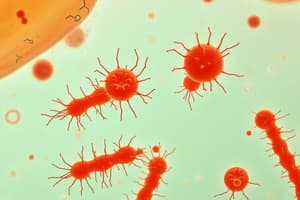Podcast
Questions and Answers
Match the type of food spoilage with their visibility:
Match the type of food spoilage with their visibility:
Mold = Visible Bacteria = Not visible Yeast = Sometimes visible Types of foodborne illness = Not visible
Match the type of foodborne illness with their descriptions:
Match the type of foodborne illness with their descriptions:
Food infections = Ingestion of living pathogenic bacteria Food intoxications = Toxins are pre-formed by pathogenic microbes in food Toxin-mediated infections = Release toxins in gastrointestinal tracts None = Caused by ingestion of non-pathogenic bacteria
Match the pathogen with its associated illness in Canada:
Match the pathogen with its associated illness in Canada:
Norovirus = Causes gastroenteritis Listeria monocytogenes = Causes listeriosis Clostridium botulinum = Pre-formed toxins in food E. coli H7 = Toxin-mediated infection
Match the pathogen with its characteristics:
Match the pathogen with its characteristics:
Match the foodborne illnesses with their examples:
Match the foodborne illnesses with their examples:
Flashcards
Microbial Food Spoilage
Microbial Food Spoilage
Decomposition of food caused by microorganisms like mold, bacteria, and yeast.
Food Infections
Food Infections
Illness caused by ingestion of living bacteria that multiply in the host's organs.
Food Intoxications
Food Intoxications
Illness resulting from pre-formed toxins in food, which can remain after cooking.
Toxin-mediated Infections
Toxin-mediated Infections
Signup and view all the flashcards
Top Pathogens in Canada
Top Pathogens in Canada
Signup and view all the flashcards
Study Notes
Microbial Food Spoilage
- Visible: Mold
- Not visible: Bacteria, yeast
- Food infections: Living pathogenic bacteria ingested, multiply in the host's organs after consumption (e.g., Salmonella, Listeria)
- Food intoxications: Toxins are pre-formed by microbes in food, remain after cooking (e.g., Clostridium botulinum, Staphylococcus aureus, Bacillus cereus)
- Toxin-mediated infections: Ingesting large numbers of live pathogens releases toxins in the gastrointestinal tract (e.g., Clostridium perfringens, E. coli O157:H7)
- Top pathogens in Canada: Norovirus (highly contagious, causes gastroenteritis); Listeria monocytogenes (causes listeriosis, resistant to heat, salt, nitrite, low temperatures, acidic conditions, found in smoked fish, raw milk, soft cheeses, prepared meats, leafy greens); Salmonella (causes gastroenteritis); E. coli (causes gastroenteritis, can form biofilms, lives in cattle, causes kidney failure, bloody diarrhea); Staphylococcus aureus (toxin not destroyed by cooking); Campylobacter (associated with IBS, reactive arthritis)
- HACCP: Hazard Analysis and Critical Control Points, a globally applied food safety system.
Studying That Suits You
Use AI to generate personalized quizzes and flashcards to suit your learning preferences.




